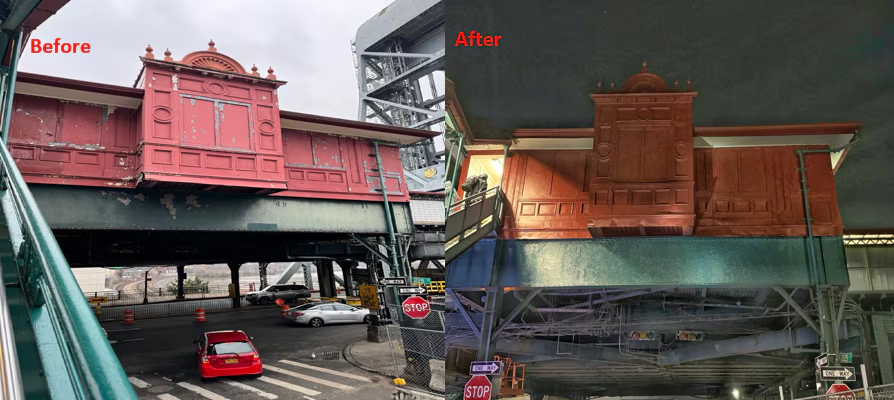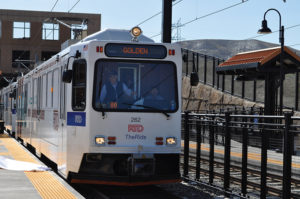Cops step up vigilance after fatal Metra crashes
Written by jroodIt wasn't a good day for Caine Hlavaty, who was ticketed for trying to beat the crossing gates -- and an oncoming train -- while riding his bike across the tracks in Elmhurst, the Chicago Tribune reports. Now he was complaining he had missed his bus for work.
That was of little concern
to police Cmdr. Jim Kveton and five other officers on an early morning safety
patrol last week at the Metra station. They were cutting violators little
slack. Kveton believes strict enforcement is one reason why the suburb has had
only one crossing fatality since 1994.
"The word is, nobody
gets a pass in Elmhurst," he said.
Vigilance at rail crossings
in suburbs such as Elmhurst, Lombard and Des Plaines has been ramped up in the
wake of last month’s double-fatal crash in North Chicago. Anyone skirting
lowered gates or ignoring signals is apt to get a ticket, carrying a $250 fine.
Despite flashing warning
lights, bells and the train’s blaring horn on the foggy morning of March 13,
Blanca Villanueva-Sanchez, 34, and her 18-month-old goddaughter were run down.
Carrying the child, Villanueva-Sanchez was trying to beat a 70-mph Metra train
across the station tracks.
The tragedy — caught on
video by the locomotive’s camera and widely viewed — happens all too often in
Illinois, where 16 non-suicide deaths were reported last year. On a typical
day, police and Metra say, late-running commuters dash across tracks as trains
bear down. Teenagers play "chicken" on the tracks and taunt
engineers. Motorists disregard warnings and go around gates.
Such incidents raise the
question: Why do people take chances at train crossings when one false move,
one slip or one miscalculation can prove deadly? Police, safety experts,
veteran railroaders and psychologists say hastiness on the part of stressed-out
commuters is the main reason. People also don’t pay attention to warnings, or
simply follow the crowd. Others, who ordinarily would not take risks, act
impulsively.
Temple University
psychologist Frank Farley, who studies risk-taking behavior, believes people’s
personalities fall somewhere between those who are completely risk-averse and
those he calls "Type T" personalities, or thrill-seekers.
"Intelligence doesn’t
seem to be one of the factors," Farley said. "We say, ‘God, that’s
stupid.’ But you still get intelligent people doing it."
Stress and pressure can
play a role, said Dr. Emil Coccaro, professor of psychiatry at the University
of Chicago. Some people act impulsively with little provocation, he said.
"You don’t want to
cross train tracks. … The vast majority of people know you don’t do
that," Coccaro said. "(Villanueva-Sanchez) may have felt pressure to
do that."
As the Metra video clearly
documented, Villanueva-Sanchez, carrying the infant, was trying to catch up
with her husband, daughter and son, who had crossed just ahead of her at the
North Chicago station.
Dr. Lanny Wilson, one of
the Chicago area’s most ardent rail-safety advocates, said people often ignore
warnings and cross tracks without thinking about the danger.
"The problem was that
first person who went across and disobeyed the warning devices," said
Wilson, head of the DuPage Railroad Safety Council. "The person who got
struck was the sad victim of that first decision," said Wilson, who became
an activist after losing his own daughter in a rail-crossing crash.
Doug Davidson, a longtime
engineer for the Union Pacific and Metra, believes such go-along behavior is
often to blame for collisions. Now an official with the Brotherhood of
Locomotive Engineers and Trainmen, Davidson has been in the cab when four
fatalities occurred. He remembers each vividly.
"There are times when
people do things and are unaware of the train, and other times they make a
willful decision to try to beat the train," Davidson said.
Illinois Commerce
Commission data show 2009 was a record year for safety at public highway-rail
crossings in Illinois with 80 collisions involving trains, vehicles and pedestrians.
Non-suicide deaths fell to 16 from 25 in 2008, when there were 129 collisions. With
Commerce Commission funding, the rail-safety organization Operation Lifesaver
teams with police departments to educate people about safety awareness.
"People don’t think
something bad is doing to happen to them," said Chip Pew, head of
Operation Lifesaver. "The sad thing is, trains don’t give do-overs.
There’s no second chance."
On the platform recently at
the Belmont Road Metra station in Downers Grove, Pew and police handed out
reminders to commuters about crossing safety, along with warning notices to
those who weren’t careful. Next time, however, violators won’t be so lucky.
They may get tickets and face hefty fines.
That was the case last week
in Elmhurst where Hlavaty, 36, was stopped, despite his vigorous protests that
he’d done nothing wrong. With no driver’s license, he complained, "What’s
a person like me do?"
Even stepping onto tracks
before the lights stop flashing and the gates are completely raised may result
in a ticket. DuPage County judges are allowing some first-time violators to
plead guilty, pay court costs and perform community service in lieu of the $250
fine.
Chris Fox, of Lombard, took
such a deal. Fox, 40, made the mistake of crossing the tracks in Lombard before
the warning lights had stopped. A police officer was waiting for him.
"I definitely pay
attention now when I walk across the tracks," Fox said. "I make sure
there’s no flashing lights."
That’s the goal, said
attorney William Belmonte, who prosecutes Elmhurst’s cases in court.
"The cops are the guys
who have to pick up the body parts," Belmonte said. "That’s what they
are focused on preventing."





